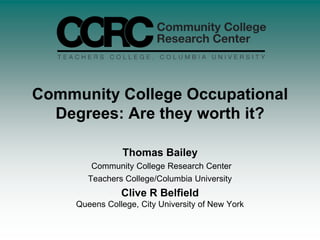Community College Occupational Degrees: Are they worth it?
From the Penn IUR and Penn GSE sponsored conference: “Preparing Today’s Students for Tomorrow’s Jobs in Metropolitan America: The Policy, Practice and Research Issues" May 25-26, 2011 Organized by Laura Perna, a professor in Penn GSE, and Susan Wachter, a professor in Penn’s Wharton School, “Preparing Today’s Students for Tomorrow’s Jobs” explores the most effective institutional and public-policy strategies to be sure high school and college students and adult learners have the knowledge and skills required for future employment. “The conference addresses such critical questions as: How do we define success with regard to the role of education in preparing students for work?” Perna said. “How well are different educational providers preparing future workers? What is the role of public policy in improving connections between education and work? “It seeks to improve our understanding of several fundamental dimensions of this issue through insights from federal, state and local policy leaders, college administrators and researchers.” Guest speakers include Eduardo Ochoa, assistant secretary of the U.S. Department of Education; former Pennsylvania Gov. Edward Rendell; Lori Shorr, chief education officer to Philadelphia Mayor Michael Nutter; Charles Kolb from the Committee for Economic Development in Washington, D.C.; Claudia Neuhauser from the University of Minnesota; Bethany Krom from the Mayo Clinic; and Harry Holzer from Georgetown University. “Much recent attention focuses on the need to improve high school graduation and college degree completion. But, relatively less attention has focused on whether graduates and degree recipients have the skills and education required by employers,” Perna said. The event is sponsored by the Penn’s Pre-Doctoral Training Program in Interdisciplinary Methods for Field-Based Research in Education, with funding from the U.S. Department of Education’s Institute for Education Sciences in collaboration with Penn’s Institute for Urban Research.

Recomendados
Recomendados
Más contenido relacionado
Más de Penn Institute for Urban Research
Más de Penn Institute for Urban Research (20)
Último
Último (20)
Community College Occupational Degrees: Are they worth it?
- 1. Community College Occupational Degrees: Are they worth it? Thomas Bailey Community College Research Center Teachers College/Columbia University Clive R BelfieldQueens College, City University of New York
- 2. Occupational higher education 98% of certificates, 62% of AA degrees, 60% of BA degrees in career education 45% of certificates and 33% of AA degrees in health Academic higher education either precedes or is occupational higher education “Many a teacher and author writes and argues in behalf of a cultural and humane education against the encroachments of a specialized practical education, without recognizing that his own education, which he calls liberal, has been mainly training for his own particular calling” John Dewey, Democracy and Education (1916, p.313)
- 3. Community College Programs Academic versus occupational balance is sharpest for CCs: How much academic preparation before career education? How to identify students who would benefit from extended academic preparation? Manifest in distribution of certificates, AA degrees, and transfer to BA degrees; range of fields of study Certificates are 40% of awards (25% of hours)
- 4. Evidence on Earnings Premium
- 5. Research Unknowns Certificate-holders may not resemble the ‘typical’ student Certificates may be shorter, cheaper, more convenient, or linked with job placements Graduation is key (returns to completers) Certificates may supplement attainment: How do an individual’s credentials all fit together? Returns for current cohorts
- 6. Labor Market Factors Demand-side: Race between education and technology Which is most urgent: cognitive skills or occupational competencies? Certificates may be too terminal or not articulated Health sector: 40% of 8 million new jobs by 2016 Supply-side: Competition with for-profits (certificates) and four-year colleges (BA transfers)
- 7. Updated Estimates Using Survey of Income and Program Participation (SIPP) data from 2008, we calculate earnings returns: Over high school graduate For interaction of certificates with attainment Across academic and career AA degrees By field of study for certificates and AA degrees
- 8. 1. Earnings Premium over High School Graduate
- 9. 2. Certificates with attainment
- 10. 2. Certificates with attainment
- 11. 3. Earnings premium over academic credential
- 12. 4a. Field of Study: Certificates
- 13. 4b. Field of Study: AA degrees
- 14. Conclusions Returns to occupational credentials – certificates and AA degrees – are high, but many unknowns Concerns over articulation and optimal balance with academic study Significant structural change caused by the Great Recession: education programs may not be enough
- 15. For more information: Please visit us on the web at http://ccrc.tc.columbia.edu, where you can download presentations, reports, CCRC Briefs, and sign-up for news announcements. Community College Research Center Institute on Education and the Economy, Teachers College, Columbia University 525 West 120th Street, Box 174, New York, NY 10027 E-mail: ccrc@columbia.edu Telephone: 212.678.3091
